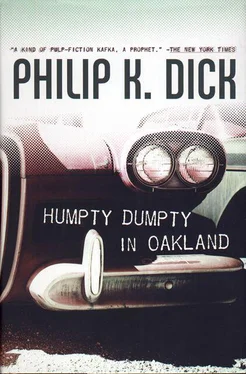“I don’t think it would be funny on TV,” the man said, “on that small screen.”
“I’ve got a twenty-six-inch screen,” Fergesson said. He decided to ignore the man; sipping his beer he gazed off in the other direction.
There, in a booth, sat Al Miller. With him was his wife Julie. And with them was the Negro in the topcoat who owned the dog; the Negro was talking to them, and all three seemed to be having a good time, and to be absolutely friendly.
In fact, from the way Al was gesturing, Jim Fergesson realized suddenly that he was stoned.
This was the first time that he had seen Al really drunk. Now and then he had seen him when he had had a few drinks, such as when he had come to dinner; his coordination had been bad, but that was not like this. This was the real thing, and the old man chuckled. He turned so that he could watch. So even gloomy Al, who always went around hunched over, never joking or laughing except maybe in sarcasm—even he let down once in a while. The guy, the old man thought, was actually human after all. He thought, Maybe I’ll go over and join him. What about that?
Watching, he saw that Al was trying to buy the dog from the colored man. He was offering him a check, which he had in front of him and was writing with his fountain pen. Julie was trying to pull the check away from him; she shook her head no, and scowled and talked to both men. She had one hand on Al’s shoulder and the other on the Negro’s.
To the old man, that seemed funny, so funny that again he began to laugh; tears again came to his eyes. He set down his drink and got to his feet. Cupping his hands to his mouth he yelled across the noisy bar, “Hey Al, that’s just the business for you.”
It did not seem as if Al had heard him; the business negotiations continued, both men deeply engrossed. So he yelled again.
This time Al glanced up. His glasses were missing, and his hair hung down over his eyes. Without his glasses his eyes had a weak, unfocused look; he peered about half-blindly, and then returned to the negotiations. He tore up the check with great labored twists of his fingers, scattered the pieces, got out his wallet, and began writing another check in its place.
Chuckling, the old man swung back to the bar and picked up his beer. What a business for Al Miller, he thought. The perfect business. A dog that bunted colored balloons in bars; and Al could pass the hat for the dog. He thought, So the dog can go to school instead of Al.
“Hey,” he yelled, again turning. But his voice was lost in the noise. “It can go to school in your place, and get that degree.”
This time Al did hear him; he saw the old man and waved his hand in greeting.
The old man slid from his spot at the bar and made his way carefully through the crowd of people over to the booth. It was really hard to hear; even when he got over to the booth he could not make out Al’s words. Bending down, he rested his hand against the side of the booth, his head close to Al’s.
“I couldn’t hear you,” Al yelled up.
“Send the dog to school,” the old man said, chuckling at what he had said, at what he had thought up. “Instead of you.” He winked at Julie, but she stared past him.
Al said, “Hell, I’m buying it to kill it. I hate the God damn thing. It’s an abomination.”
“Oh,” the old man said, still laughing. He hung around for a time, but none of them paid attention to him; they were too involved in their transaction.
“This is Tootie Dolittle,” Al said presently, introducing the Negro, who glanced up and nodded formally. “A relative of mine.”
The old man murmured something, but did not try to shake hands.
“I guess I’ll be going,” he said. They had not asked him to sit down. Now his laughter had gone. It did not seem so funny, and he felt tired. I still have to get over to the garage and work, he recalled. I can’t stick around here, and what the hell if they don’t want me to sit down. “So long,” he said.
Al nodded as the old man moved away.
I wouldn’t have sat down anyhow, he thought as he pushed the door of the bar open and stepped out onto the cold sidewalk. The fresh air blew around him as he walked toward his parked car. He took several deep breaths, which cleared his head at once. Hell, he thought. When do I sit down with Negroes?
He started up his car and drove the block or so to the garage.
Soon he was beneath a Studebaker, alone in the damp partly-lit building, his radio playing from its shelf. As he unfastened the crankcase pan of the car he thought, Why am I here doing this? Lying on his back, beneath the car . . . alone in the garage, with no one even knowing he was there. What was the purpose of it?
But he continued, unscrewing the bolts. Laboring away. So the guy can have it back tomorrow? he asked himself. Obligation to my old customers? Maybe it was that. He did not know. All he knew was that he had no other place to go, no other spot to be. There was really no problem, because he came here without deliberation; he came because he had always come. When there was nothing on TV to watch, or Lydia was out and there was no one to talk to, or things were not too interesting at the Ring-a-Ding Club.
I’ll work an hour or so, he decided. And then call home and see if Lydia’s back. That won’t be so long to work.
It seemed clear to Al Miller that soon he would have to give up his lot. He would be pre-empted for some grand purpose: the new owner would tear down the garage and put up a supermarket or a furniture mart or multiple-unit apartments. Such had been the pattern for several years in Oakland and Berkeley. Old buildings were being torn down, even old churches. And if old churches had to go, then surely Fergesson’s garage could be thrown in. And Al’s Motor Sales.
With no spirit he drove the next afternoon down San Pablo to a realtors office, to a woman that he had dealt with in the past. It was no accident that Mrs. Lane was a Negro; he had met her through the Dolittles. She had gotten Mrs. Dolittle several of her rental properties. Her specialty was business property in the non-restricted—he added in his mind, run-down —part of Oakland. He knew that he could hope for nothing better. What was a used-car lot, if not the embodiment of non-restricted Oakland?
Thinking that, he entered Lane Realty and approached the varnished oak counter. To his right, on a table, was a rubber plant in a pot with a saffron bow tied around it. Beside the plant was a stack of Saturday Evening Posts and an ashtray.
All that Lane Realty had in the way of fixtures were a desk and a typewriter, and, on the wall, a map of the East Bay. Mrs. Lane sat at the desk typing, but when she noticed him she rose and came toward the counter, smiling.
“Good morning, Mr. Miller,” she said.
“Morning,” he said.
“Now what can I do for you?” Mrs. Lane had a low, smooth voice. She wore a dark dress, and on her finger she had a nice big gold ring. Her hair had been done up, and she had on lots of makeup; as always she looked impressive. She was, he thought, about forty-five or fifty. She could have been a successful matronly receptionist or club woman anywhere, he thought, except of course that she was colored. And except for the fact, too, that when she smiled she made visible gold-capped front teeth of great size; jewelry, like her ring, the left of which showed the carving of a diamond, the right a club.
Al said, “I’m looking for a new location.”
“I see,” Mrs. Lane said. “On San Pablo? I have a lot on Telegraph Avenue.” She looked at him searchingly, to see what it was he wanted.
“I don’t care where it is,” Al said. “Just so it’s a good location.” He could think of no way to improve on that utterance; he culled his brain, but no more expressive statement came. The woman smiled at him with sympathy; beyond any doubt she wanted to help him. It was her job to do so. And her heart was in her work. He felt that.
Читать дальше










